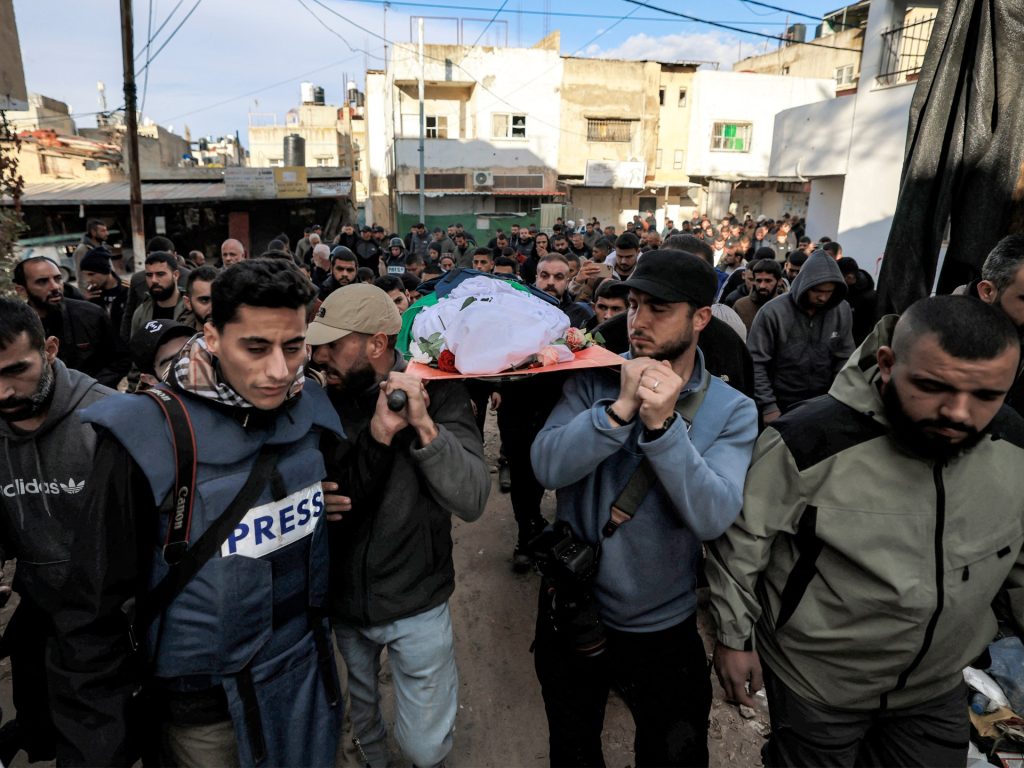On December 28, young journalism student Shatha Sabbagh left her home in the occupied West Bank city of Jenin with her mother and her sister’s two young children. A moment later, she was shot in the head and killed by a sniper’s bullet. She was only 21 years old.
Shatha was killed in the same refugee camp where veteran journalist Shireen Abu Akleh was killed by the Israeli regime in 2022. However, Shatha was not killed by an Israeli regime soldier. According to her family, the bullet that took her life was fired by the Palestinian Authority Security Forces (PASF).
For the past month, the PASF has surrounded the Jenin refugee camp, in a coordinated effort with the Israelis, as part of its efforts to crack down on armed resistance in the northern West Bank.
While the Palestinian Authority (PA) managed to subdue resistance to the Israeli occupation in many other urban centers through threats and repression, there remain pockets in the north where armed resistance groups are still present. The city of Jenin, and especially its refugee camp, where Shireen and Shatha were killed, is one such pocket. That is why the camp, which is home to more than 15,000 people, has been seen as a symbol of resistance and resilience and a thorn in the side of the PASF.
Indeed, the PA’s very existence depends on suppressing such resistance to the Israeli regime in all areas under its purported control. As such, it constantly coordinates its actions with the Israeli military and uses repression tactics that are often indistinguishable from theirs. In fact, the PASF could easily be confused with the Israeli army, if it weren’t for their different uniforms.
And while the Israelis continue with their genocide in Gaza, the PASF began their extensive act of aggression against Jenin. They imposed a relentless siege on the refugee camp, cutting off water, electricity and barring the entry of most basic supplies. The PASF also placed snipers on rooftops and set up roadblocks in order to restrict the movement of resistance fighters.
There are also reports of beatings, arrests and torture. A team from the Palestinian Red Crescent Society testified that they were detained, beaten and interrogated for two and a half days while trying to deliver medicine to besieged families.
In a video making the rounds on Palestinian social media, two men are forced to stand on one leg and repeatedly read “President Abu Mazen (Mahmoud Abbas) is God.” In another video, PASF members are beating a young man senseless, apparently for criticizing the PA’s siege of the Jenin refugee camp. Perhaps surprisingly, many are using the word “shabiha” to describe the PASF – a term commonly used for forces and groups loyal to former Syrian dictator Bashar al-Assad.
Residents of the camp have taken to the streets in protest and called on the PA to stop its brutal attack and end the bloodshed between relatives. But these calls have been ignored. Instead, the PASF is insisting that the resistance fighters either lay down their weapons or leave the camp, which they have categorically refused to do. How this will play out remains to be seen, but what is certain is that more Palestinian blood will be spilled before it is over.
For the PA leadership, the operation in Jenin is part of a much bigger picture – which allows it to position itself as the body to take control of Gaza after a ceasefire. The logic is that if the PA can prove it can quell and even eliminate armed resistance in the West Bank, Israel and the United States will facilitate its installation in Gaza. However, while the Biden administration has indicated that it would support taking over the PA, the Netanyahu government has made no such indication and, on the contrary, has categorically stated that it would reject such a scenario. However, the PA leadership continues to play its role as local enforcer in the hope of more scraps from the master’s table.
As if to prove its guilt and pour more salt into the wound, the PA recently announced its decision to suspend Al Jazeera’s operations in the occupied West Bank as punishment for its coverage of Jenin. The AP follows in the footsteps of the Israeli government which also banned the media network in May 2024, in direct response to its coverage of the ongoing genocide in Gaza.
While the betrayal of the PA leadership and security coordination with the Israeli regime is nothing new, the ongoing siege of Jenin has taken the betrayal of the Palestinian people to a whole new level. Its casual bloodshed of civilians, and shabiha-style beatings and torture, show it is more than willing to cross red lines unlikely to ever be forgotten or forgiven by the Palestinian people. None of this bodes well for the longevity of a leadership already suffering from a crisis of legitimacy for its failure to take a meaningful stand against the ongoing genocide in Gaza.
The views expressed in this article are the author’s own and do not necessarily reflect the editorial position of Al Jazeera.


